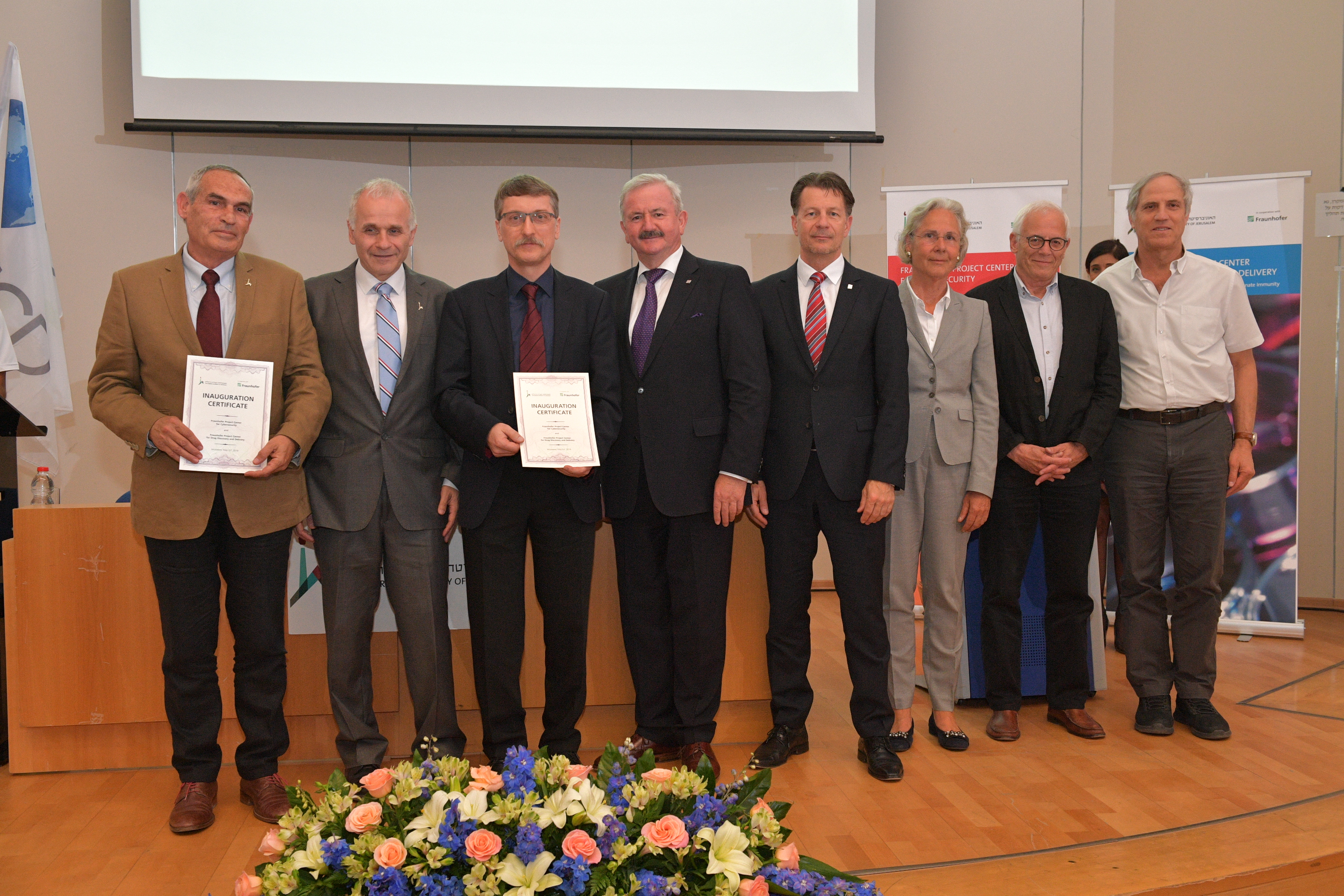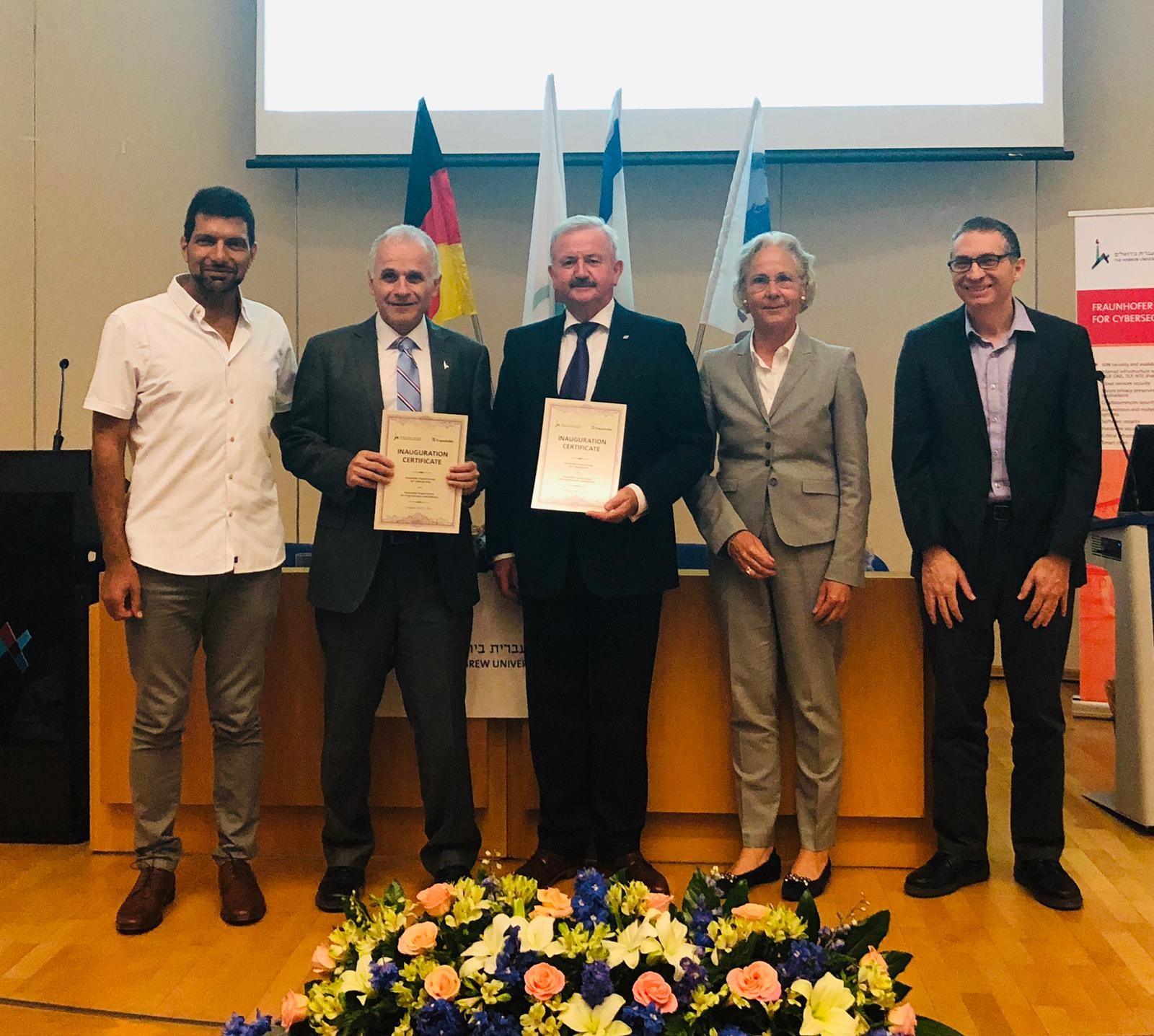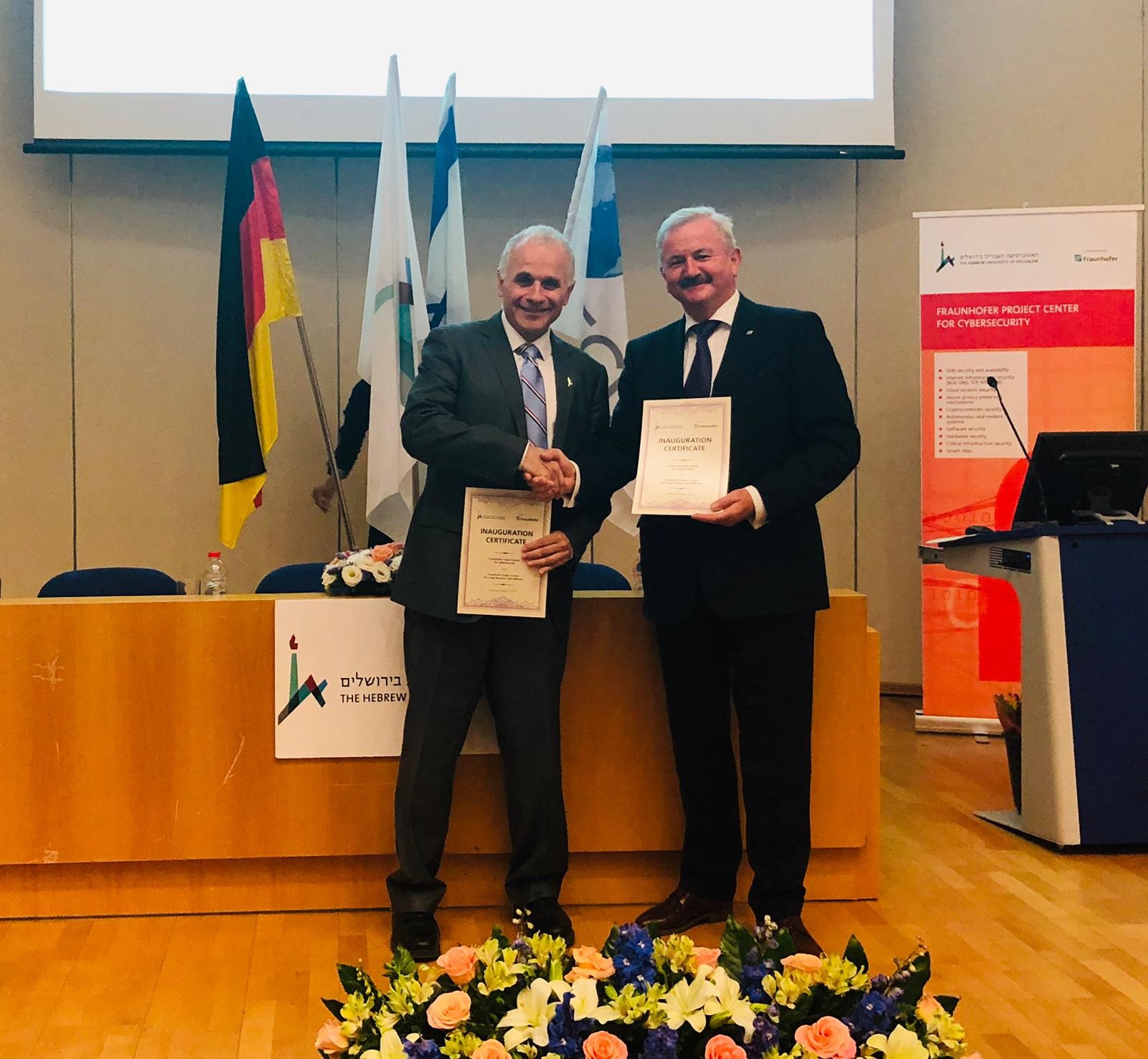Cybersecurity and Health Research: Cooperation with Hebrew University in Jerusalem
Two Fraunhofer Project Centers opened in Israel
The Fraunhofer-Gesellschaft is collaborating globally with excellent partners to create synergies for research and to build bridges to regional markets. With this in mind, two new Project Centers were opened in Israel on May 21 during a ceremony at the Hebrew University of Jerusalem: The “Fraunhofer Project Center for Cybersecurity at The Hebrew University of Jerusalem” and the “Fraunhofer Project Center for Drug Discovery and Delivery at The Hebrew University of Jerusalem”. The two Project Centers combine the expertise of the Israeli partners from the Hebrew University of Jerusalem (HUJI) with the competencies of the Fraunhofer Institute for Secure Information Technology SIT and the Fraunhofer Institute for Interfacial Engineering and Biotechnology IGB and are the first project centers of the Fraunhofer-Gesellschaft in Israel.



Both cybersecurity and health research play a central role in Fraunhofer research and are of great importance for the global economy and society. Cybersecurity is a future issue of critical importance and a prerequisite for a functioning digital industry, economy and society. The Fraunhofer-Gesellschaft's health research aims to apply the latest technologies to develop effective methods and products to improve the diagnosis, prevention, therapy, care and rehabilitation of patients. In addition to Prof. Reimund Neugebauer, President of the Fraunhofer-Gesellschaft, Prof. Asher Cohen, President of the Hebrew University of Jerusalem and Dr. Susanne Wasum-Rainer, Ambassador of the Federal Republic of Germany, numerous other high-ranking representatives from science, politics, industry and society took part in the festive opening of the two project centers at The Hebrew University of Jerusalem.
“Science knows no borders and international cooperation has long been a cornerstone of today's cutting-edge research. By cooperating with excellent partners around the globe, we are strengthening the transfer of knowledge and setting new impulses for Germany and our international partners,” explains Prof. Reimund Neugebauer, President of the Fraunhofer-Gesellschaft. “We look forward to continuing our close cooperation with our Israeli partners in two strategically important research areas. The new collaborations in the fields of cybersecurity and health research will soon have positive effects for all those involved thanks to their complementary competences.”
Dr. Susanne Wasum-Rainer, German Ambassador to Israel, says: “New technologies and the digitalization regarding all aspects of life provide coexisting chances and challenges. It is crucial to handle them responsibly – and I am convinced that this obligation is in good hands at the Hebrew University and at the Fraunhofer-Gesellschaft.“
Security innovations and new strategies for cybersecurity
The “Fraunhofer Project Center for Cybersecurity at The Hebrew University of Jerusalem” will serve as a bilateral R&D platform for companies and form the core of a network of excellence in the field of cybersecurity. The Project Center is to become an international hub for security innovation and is located at the Faculty of Computer Science at Hebrew University. In the collaboration between scientists from the Fraunhofer Institute for Secure Information Technology SIT and Hebrew University, new strategies are to be developed to protect data, IT systems and critical infrastructures from unauthorized access.
“Israel is one of the most innovative nations and the Hebrew University is one of the world's leading research universities. With this Project Center for Cybersecurity, the Hebrew University and the Fraunhofer SIT are pooling their expertise,” says Prof. Michael Waidner, director of Fraunhofer SIT and Co-Director of the Project Center. “I am optimistic that the Project Center will quickly become the top address for application-oriented and industry-oriented cybersecurity research in Israel.”
HUJI President Professor Asher Cohen praised the partnership, adding, “We work hard to strengthen the link between scientific research and its applications in real life and industry. Today, we’re taking the next step towards this goal and are honored that Fraunhofer chose us to be their academic partner.”
“Hebrew University’s Faculty of Computer Science and Engineering is excited by the potential for excellence in this partnership,” shares Prof. Danny Dolev, Chair of HUJI’s Rachel and Selim Benin School of Computer Science and Engineering. “The Project Center will open new avenues for research and provide us a united force with which to tackle critical cyber challenges.“
Research into a new generation of drugs
The “Fraunhofer Project Center for Drug Discovery and Delivery” is a cooperation between the Fraunhofer Institute for Interfacial Engineering and Biotechnology IGB and scientists from the Institute for Drug Research of the Faculty of Pharmacy at Hebrew University. The aim of the Project Center is to use innovative and efficient methods to identify lead structures and nanocarriers for new drug candidates in order to make them accessible for the treatment of infectious diseases, inflammatory processes and autoimmune diseases. To this end, various innovative technologies are combined to support pharmaceutical companies in the development of new active substances in the preclinical phase as well as to discover new active substances and bring them to the target location by means of targeted formulations.
As Prof. Gershon Golomb at HUJI‘s Institute for Drug Research explains, “The Fraunhofer Project Center for Drug Discovery and Delivery at The Hebrew University of Jerusalem is a wonderful outgrowth of the close cooperation between the IGB (Fraunhofer Institute for Interfacial Engineering) and the IDR (Institute for Drug Research, School of Pharmacy, Faculty of Medicine, HUJI). Dating back to 2012, our transnational research collaboration focuses on infections (herpesviridiae, herpes simplex virus), inflammation and innate immunity. In the years to come, we hope to develop and evaluate new immuno-modulators using computational chemistry and to examine targeted delivery systems for genes and drugs, mainly nano-medicines.“ Further, Golomb shares, “the contributions of individual research groups functions like a complementary feeding model: each partner depends on the expertise of the other, and only by working together will we succeed.“
“I am delighted that the successful cooperation between the Fraunhofer IGB and the Institute for Drug Research at Hebrew University is now being continued at a new level. In this way, we are jointly positioning ourselves as an international research partner in the field of drug development for pharmaceutical companies from all over the world,” says Dr. Markus Wolperdinger, Director of the Fraunhofer IGB. “Thanks to the unique combination of complementary expertise, the Project Center for Drug Discovery and Delivery will develop into a highly visible innovation center for new active ingredients and novel formulations,” adds Prof. Steffen Rupp, who heads the Project Center on the German side.
Added value through international collaboration
International collaborations with excellent research partners promote the innovative strength of the Fraunhofer-Gesellschaft and provide direct access to the most important present and future scientific and economic regions. Therefore, in view of globally networked value chains, bilateral or multilateral collaborations are an important prerequisite for long-term success in global competition. Research collaborations in an international context are successful and lasting if the expertise of the partners complement each other and thus generate added value as well as new scientific added value.
 Fraunhofer Institute for Interfacial Engineering and Biotechnology IGB
Fraunhofer Institute for Interfacial Engineering and Biotechnology IGB